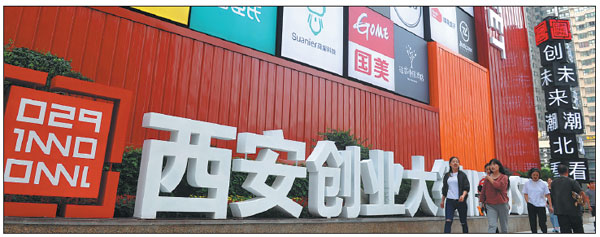Xi'an seeks to build upon national central city accolade
Xi'an, recently announced as a national central city, is pushing to improve its urban and rural development and increase its comprehensive economic strength, according to the local government.
As an important historic city in Northwest China, Xi'an has set the target of 2035 for the completion of a fully-functioning urban and rural system to strengthen its position in line with the country's governance.
The Shaanxi provincial capital is also building itself into an important regional financial center, a foreign exchange center, a cultural and innovation pivot of the Silk Road Economic Belt and an integrated transportation hub.
The government said it is investing heavily in the Xi'an High-Tech Industries Development Zone and Xi'an Economic and Technological Development Zone, as well as building industrial transfer demonstration zones focusing on automotive, equipment manufacturing, electronic information, biomedicine and food processing industries.
Xi'an is seeking to capitalize on being promoted to become the ninth national central city on Feb 7, according to a development plan released by the National Development and Reform Commission for the Guanzhong Plain urban cluster.
The national central city concept was proposed by the Ministry of Housing and Urban-Rural Development in 2005 as a first step in reforming urbanization in China. In 2010, the first batch of national central cities - Beijing, Tianjin, Shanghai, Chongqing and Guangzhou - was identified. Chengdu, Wuhan and Zhengzhou were added to the list in 2016.
National central cities have the core function of embodying the country's domestic agenda, undertaking national tasks, driving the development of their regions and participating in international cooperation and competition on behalf of China.
Xi'an will exploit its natural advantages and solid foundations as a national central city by integrating historical glories and modern development in a harmonious way, the local government said.
The city is one of the most important birthplaces of Chinese civilization and the eastern starting point of the ancient Silk Road. It was also the capital of 13 feudal dynasties and serving as China's political, economic and cultural center for more than 1,100 years.
Featuring strong cultural representation and inclusiveness, Xi'an is achieving its strategic objective of becoming an international metropolis that boasts historical and cultural features, said a spokesman for the government, adding that it will play a crucial role in economic cooperation and exchange between Asia and Europe espoused by the Belt and Road Initiative.
In recent years, Xi'an has achieved its goals in terms of economic and social development by piloting a series of national strategic policies, such as a campaign to develop the vast western regions of China, military-civil integration and free trade test zones.
In 2017, the city's GDP was nearly 750 billion yuan ($118.47 billion), an increase of 7.7 percent year-on-year. A total of 847 project contracts were signed in the city last year, with total investment of 2.35 trillion yuan, making Xi'an one of China's most attractive destinations for outside investment in 2017.
On the technological front, Xi'an is recognized as a scientific pioneer, with its comprehensive science and technology strength ranked No 3 nationwide. Last year, the city achieved 80.9 billion yuan in scientific and technological trade.
Xi'an has over 3,000 scientific and research institutes, 63 colleges and universities, 67 academicians of Chinese engineering and sciences academies, and 800,000 technicians with various skills. More than 300,000 higher education students graduate every year in the city, including about 20,000 graduates with master's degrees and doctorates.
Home to the Terracotta Warriors, Xi'an plays a significant role in the promotion of international cultural communication, and has four foreign consulates, 17 visa centers and 31 friendship cities overseas.
It is also the first city in Northwest China to adopt a 72-hour visa-free entry policy for visitors from 51 countries.
As a must-see destination in China, Xi'an has been visited by more than 200 foreign leaders since 1979.
haonan@chinadaily.com.cn
|
Xi’an is seeking to become a national central city in the next few years.Provided to China Daily |
(China Daily 03/08/2018 page14)















